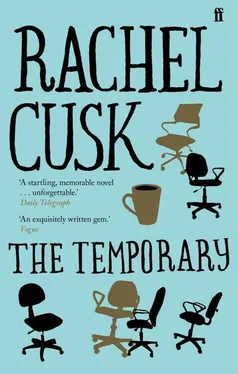News of David’s indiscretion spread quickly through the town, and over the next few weeks Francine experienced a distinct and unpleasant cooling of manners towards her as she went about her business. In this change of climate, her dormant hatred of the place where she had grown up suddenly sprang and flowered. She didn’t exactly feel guilty about what had happened, but when she looked up at the dinner table and caught her parents’ troubled eyes on her, it occurred to her how enjoyable it would be to go somewhere else. One evening she told them of her intention to move to London, and to her surprise they hadn’t seemed particularly upset and had said it was probably for the best. Francine had really only made her announcement with the purpose of getting used to the idea, but when her father said that he would give her a thousand pounds to get her on her way, she sensed that things were moving rather more quickly than she had anticipated. Still, she was glad of the money, which gave her the satisfaction of thinking that, all in all, things had worked out for the best.
She rose from the bath and lost herself for a while in the generous administration of resources to all her surfaces. Finally she donned her bathrobe and drifted to the sitting-room to telephone her mother.
‘Yes, love,’ said Maxine wearily when Francine announced herself.
‘Don’t sound too pleased,’ snapped Francine, who disliked her mother’s latest habit of inferring that her life was one of constant, complex demands, when Francine felt sure that she was only watching television with Frank.
‘Don’t start, Francine. What is it?’
‘What’s what ?’ She would have put the phone down there and then, had she not wanted to discuss her evening with Ralph. ‘You asked me to call you.’
‘Well, we hadn’t heard from you for so long,’ sniffed Maxine. ‘I just wanted to know you were still breathing.’
‘How’s your class?’ said Francine, knowing the enquiry would put her mother in a more communicative mood. Not wishing to hear the answer, however, and confident that it would be lengthy, she put the receiver down on the table and went to the kitchen to get a glass of orange juice. When she returned, she could hear her mother’s voice squeaking with alarm from the abandoned telephone.
‘Francine! Francine!’
‘I’m here.’
‘Where did you go?’
‘I was listening to you talking about your class.’
‘I told you, I didn’t go this week. I’ve hurt my back — as if you were interested!’ She gave an unbecoming snort of laughter. ‘Francine, it’s very rude to just go off when a person’s talking to you. I don’t know what gets into you sometimes. Your father and I sometimes sit for hours trying to remember what terrible thing it was that we did to you. I know you think my aerobics is boring, but it’s very important to me and—’
‘Sorry,’ said Francine.
‘— and you haven’t even asked how your father is yet.’
‘How is he?’
‘He’s been unwell, as a matter of fact. We thought he had cancer.’
Such excursions into tragedy were a frequent feature of Maxine’s conversation.
‘Really?’ said Francine. She lay back on the sofa and examined her freshly shaven legs.
‘But the doctor said it’s just a bit of constipation. He’s got to cut down on his fats. Not that I ever give him fatty foods, mind you. I learnt that lesson long ago with my own problems. Still, we’ll get by.’
There was a clamour on the line as the extension was picked up.
‘I’m fine,’ bellowed Frank. ‘Just a bit bunged up is all.’
‘Good,’ said Francine.
‘And what’s madam been up to? Out all night, I don’t doubt, causing trouble.’
‘Catting about!’ interjected Frank helpfully.
‘Oh, I’ve been busy,’ sighed Francine, relaxing into a cushion. ‘I’ve got a new job.’
‘The last one didn’t last long,’ said Maxine suspiciously. ‘Why can’t you seem to hang on to anything?’
‘It was only temporary, Mum. This one’s much better. The agency thinks it’ll be permanent.’
‘What’s it involve?’ interrupted Frank.
‘It’s with an investment bank in the City, working with the director.’
Francine enjoyed their bewildered silence.
‘Make sure you hang on to it,’ said Frank finally, hanging up.
‘How’s that Janice? Frank and I think she’s a very nice girl.’
‘She’s fine.’
Maxine had a habit of drawing unshakable conclusions about people from the way in which they comported themselves on the telephone.
‘You’re still getting on, are you?’
‘Of course we are.’
‘There’s no “of course” about it, Francine. You’ve quite ruined my new address book, what with all the crossings out. You can be very difficult to live with sometimes. Believe me, I’m the expert.’
‘Thanks.’
‘You say you’ve been busy,’ said Maxine after a pause, her manner warmer now after the exercise of her resentments.
‘I’ve been out a lot.’
‘I’ll say you have. I’ve got to know that machine of yours so well it invited me round for tea.’ Her laughter shrilled down the phone.
‘I went to a party in an art gallery.’
‘Very grand,’ said Maxine, catching her breath. ‘Anybody nice there?’
‘Oh, I met a lot of people. Journalists, mostly. Everyone was really nice.’
‘So nobody special.’
‘I just said, lots of people!’
‘I suppose they don’t have names.’
‘Well, there was a journalist I liked called Stephen, and a friend of his called Ralph.’
‘What sort of friend?’ said Maxine darkly.
‘Just a friend,’ said Francine, exasperated. ‘He invited me to dinner at his house.’
‘And what does the friend do for a living? He’s the arty type, I suppose.’
‘He works in television.’
‘I see. You’re going to tell me next he’s going to put you on it.’
‘Don’t be stupid.’
‘Watch your mouth, young lady. I suppose he can cook, too.’
‘He made risotto,’ said Francine. ‘He owns a flat in Camden.’
‘Well, that’s what he says,’ said Maxine. ‘But you never know, do you? He might have it mortgaged up to the hilt. Why didn’t he take you out? Is he tight?’
‘You don’t know anything,’ sighed Francine. ‘Everyone has dinner parties these days.’
‘Pardon me for living,’ said her mother.
Afterwards, Francine felt dissatisfied by the conversation. She wished Janice would come home. Eventually she got up and walked restlessly around the sitting-room for a while. She wondered if Ralph would call again, and realized that he might have been trying all that time she was on the phone to her mother. Finally, she sat down on the sofa and picked up a magazine.
Camden Road was a flooded river of cars and from the top of the bus Ralph had watched the traffic jam take on the irremediable, erupted look of a disaster. For a while the packed chain of dirty, disparate metals had been forcing itself thickly through the gates of the traffic lights in a unified triumph of will, but suddenly it was as if the crowd of cars had lost faith in the principles of their community and people had begun breaking from lanes in an attempt to escape, skewing themselves across the white lines and nudging into other hostile queues to a rising clamour of horns. Ralph knew that he should get off the bus and walk the last half-mile to the office, but he was hindered by a strange paralysis, an inability to free himself from this vision of chaos in which he seemed so to belong. Unchained and let loose in the streets, who knew where he might wander? On a Monday morning such as this, when his membership of the city was an imprisonment and the emergent self the weekend had allowed to roam must be forced back into its cell, it was better that he should be delivered defeatedly to his door.
Читать дальше












